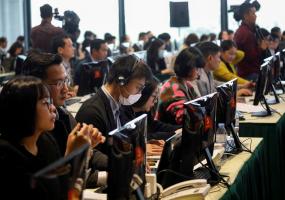International reporting on TV; what gets on, what doesn't, and why
10 Nov 2010
Nagwa Abdallah writes:
Eamon Matthews, executive producer of "Unreported World", Channel 4 and the managing director of Quicksilver Media, provided convincing answers to these three key questions. Matthews said, "I read a lot of papers criticizing what has been covered, why a particular issue has been covered, why others have not, why it has been covered this way and why it has not been covered that way". However, he said people who study international coverage do not pay enough attention to the type of media, in this case television; they think about journalism and about the issues, but not enough about the medium of television. Matthews listed four key ingredients for getting a television documentary on air: strong pictures, strong characters, secret filming, and a strong narrative. 'I spent my life trying to come up with ideas, pitching them for broadcasts to BBC and Channel 4', Matthews explained. "According to my experience, if you are going to run a documentary on the television, you need to have some pictures to film, you have to see something happening and to know what you are going to film. So the first filter that you have to put any idea through is "Will you see pictures?":' Matthews explained that television insists that you film things you can actually see; television puts the viewers in situations and places where they can have a real view of what these places and situations are like. The second quality documentary coverage needs is characters or people. A documentary needs to be engaged in people's humanity; as soon as you start exploring people's lives you start to uncover the reality of their lives. 'Of course the idea is important' he said, 'but a character will make it more important. Within our company we have been talking a lot about how to build the documentary more around the characters.' A third element that is becoming more important is what Matthews called 'transgression' programming which includes secret filming - to go to places you are not meant to go like Zimbabwe to get the truth and uncover what is going on. 'One final quality that a TV documentary needs is a strong narrative or story. Television cannot really do analysis-based programmes, because the human mind does not work like that. What we actually need is a television story, where there is cause and effect. If you can get that story, you can then put fantastic analysis into the story script.' Matthews argues that if you get all these four aspects right, then you can start to think about the journalism aspect in the documentary. Journalism in a documentary can be as good as that in newspapers, magazines or radio, but it often comes after the other four ingredients. He also pointed out that stories that point to universal human values, or give a voice to the voiceless are also good selling points. During the course of the presentation Matthews showed clips from some of his company's programmes, including "Terror in Mumbai" which his company produced and won a BAFTA for in 2010. The documentary has several scoops in it, but according to Matthews, its special appeal was that 'for the first time we managed to make a documentary to be told by the terrorist himself and not the victims - though it does include some victims. We had the audio of the terrorist talking to his controllers, and the video of the interrogation of the terrorist after he was captured. Some viewers ended up feeling some sympathy for the terrorist.' he said.




